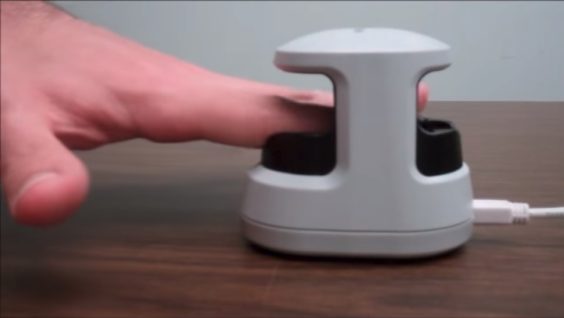
Would coupon scammers be as likely to cheat the system if they knew their store would scan their fingerprint while checking out? Would any shoppers be willing to volunteer this piece of personally identifiable information, If it meant they didn’t have to carry around coupons, cash or even a smartphone anymore?
Two Japanese firms are testing out a system that would essentially let you store coupons, personalized deals and a payment method – all on your fingertip.
The tech firm Toshiba and the telecommunications company KDDI have announced a trial run of a biometric retail system that would let shoppers check out with their fingerprint. The test occurred at a KDDI retail store and at a donut shop in Tokyo. Users of the system would first register with the retailer, providing their payment information and biometric data. Then, when they confirm their identity with a fingerprint reader at the checkout, their transaction is complete. Whatever payment method is saved in their account is automatically charged, and any coupons saved to that account are automatically applied, without having to swipe a card or a smartphone or enter a phone number on a keypad.
All of this applies to digital coupons – not paper. So it won’t help stop the kind of fraud that involves counterfeit printed coupons or misusing legitimate paper coupons on the wrong products. But digital coupons aren’t immune to fraud – consider what can happen when shoppers scan a doctored mobile coupon bar code, or sign up for multiple digital coupon accounts using multiple fake phone numbers, to get extra copies of otherwise single-use coupons. None of that will be possible as long as the coupons saved to a customer’s account are the only ones that are useable, and if you presume that shoppers won’t be able to fake multiple sets of fingerprints.
All of the customer data will be encrypted and stored on Hitachi’s secure blockchain network. The tamper-proof network can be accessed and updated instantaneously, and any retailer participating in the program will be able to see whether single-use coupons have been applied, so they won’t be able to be used again.
It’s the latest proposed system that aims to apply blockchain technology to the world of coupons. Earlier this year, coupon publisher News America Marketing announced an upcoming pilot program involving blockchain technology.
And what is blockchain, for the uninitiated? News America described it as well as anyone, calling it “a digital ledger of economic transactions that cannot be corrupted and can record virtually everything of value” – such as coupons. Coupons that exist on the blockchain can’t be manipulated, and records of redeemed coupons that are stored on the blockchain cannot be altered.
“Offers will not only be processed and cleared, they will be authenticated as real by their very existence on the blockchain,” News America explained. “This approach would eliminate the lag time and data-disconnect that allows coupon fraud to exist.” The system could also help prevent the stacking of overlapping offers – if both digital coupons and News America-owned Checkout 51 rebate offers exist on the blockchain, for example, the system can ensure you don’t use both on a single purchase.
Using blockchain technology would also help make the coupon redemption and settlement process much faster, as compared with the current system, which News America says is “caught up in an antiquated clearing process that dates from the 1950’s” – namely, gathering up paper coupons and shipping them off to a clearinghouse to be sorted and added up.
And, most importantly for coupon users, the blockchain would allow digital coupons to be used at any retailer participating in the program, whereas most digital coupons are now retailer-specific. Such a program would give shoppers “a simple, no-hassle experience where a coupon is loaded to their phone and instantly redeemable anywhere they choose to shop,” News America said.
Mastercard is also looking to apply blockchain technology to coupons, in a slightly different way. In a recent U.S. patent application, the payments and technology company described a system that would use a blockchain to offer personalized coupons that cannot be shared with or transferred to others. In its system, “the issuing entity is not required to store or manage any data, thereby freeing up resources and processing power,” the patent application reads. “This can, in turn, decrease a merchant’s likelihood of redeeming fraudulent coupons and thus enable the entity to issue coupons with a higher loss.” In other words, retailers could offer more valuable coupons to shoppers, since those coupons would be less susceptible to overredemption.
But Mastercard and News America Marketing are big legacy companies. A scrappier startup thinks it has the better blockchain solution. The company A7 Core is promoting its own method as an alternative to those offered by the big guys, who it says may have entrenched interests in the current method of redeeming and processing coupons. “The clearinghouse business depends on the current coupon validation process,” A7 explains. “Our platform allows us to pursue the development and implementation of blockchain without being impeded by the obstacles incumbents face.”
From consumers, to retailers, to clearinghouses, to manufacturers, and more, A7 notes that “there can be as many as 6–10 different entities touching a digital coupon from inception to redemption. Every additional entity involved drives up costs, creates unnecessary process friction, and increases the risk of error and fraud.” So it says storing coupons and coupon transactions on its blockchain could streamline the whole process.
In theory, any of the proposed systems could work well. But they would require a lot of different entities to put aside their competing interests and work together to make it all happen.
And, lest we forget, one of those interested parties is couponers themselves. Would you like to select digital coupons and be able to use them anywhere, instead of loading them to cards for each and every store where you shop? Sure, who wouldn’t? Would you like it if stores and manufacturers stopped issuing paper coupons as a result, and made you scan your fingerprint in order to redeem their digital offers? Maybe not.
So the future of couponing may look a whole lot different than it does today. The only question is when, and in what form, that future will arrive.
Image source: Hitachi











No thank you!!! It isn’t fair to the HONEST couponers. And plus puts the coupon cos out of business. I PASS! No way no how that no co is going to digitalize or whatever my fingers.